
9 June 2013
English Translations of Cubans Writing From the Island
Editor’s note: This open letter is to international journalists who were permitted a carefully orchestrated visit into selected Cuban prisons who later issued generally favorable reports on the conditions there.
I like to think they were duped, that their naiveté prevented them from understanding that the whole show was put together for their visit, or perhaps that international ethics do not allow the journalist force to demand that the reality not be hidden from them.
The truth is that, in one way or another, they helped to give credibility to a dictatorship that mocks the international media, in this case, you were the ones who mocked us, the prisoners, the disadvantaged, and the dictatorship was the beneficiary.
With this in mind I tried to explain to you, without having all the elements to fully understand what the mechanism of choice to be part of this International Commission in which you participated worked, and from which you didn’t look more deeply into what they were showing you on this visit. So they prepared a crude stage that no one, least of all a journalist, who had access to the Internet and to the independent press, could have believed if they had undertaken the slightest observation.
I was one of the inmates they removed before you arrived. At first they tried to fool me, then when I protested because my intention was to talk with you, I was taken by force between several guards in front of over a hundred young people, students I imagine, who were waiting at the entrance of La Lima prison. They listened to my exalted explanation while I was being handcuffed for more than ten soldiers who chased me while I screamed that they were cheaters, that they were hiding me to deceive international public opinion, that I was an honest writer who was serving a sentence for thinking differently, and that thinking differently was not a crime. Seeing so many young people, I asked them not to handcuff me, not to let themselves be manipulated because they had been assigned the dirty work of the dictatorship.
By then I had yielded before the forces they doubled against me and I let them take me, though still shouting that my work was being a writer who honestly denounced their constant arbitrariness.
The person who personally took me by force was the same one who welcomed you, with the same face, the same look, the same lack of conscience in both cases. Lt. Col. Carlos Quintana, Chief Provincial Prison in Havana.
Before getting into the paddy wagon that would take me away, I swore to pursue them with my denunciations for the rest of my life, and told him that if I thought of killing myself, it was because I had no fear of dying for the freedom of Cuba.
Finally, they put me in the paddy wagon and took me out from the back of the camp.
The lie came to its end, the transfer to a hospital, as the officials had promised was not done. I was taken to a prison of greater severity, violating their own laws because my sentence is minimal and it is supposed to be served in a camp.
In this operation, in addition to Lt. Col. Carlos Quintana, also taking part were the Lieutenant Colonel of Section 21 of the State Security and Colonel Almanza, first deputy of General Marcos, chief of National Prisons, according to what was presented in the interview he had with me days before, with the intention to agree to my “hospitalization” to submit to a “health check.”
As you can see, there is only one beneficiary, the Castro brothers’ regime, which for more than half a century has flouted international organizations, misrepresenting to the mass media the Cuban reality, making themselves true specialists in emulating the methods of Nazi propaganda.
I hope that the members of the Commission have learned as a lesson, that if in the future they return to be part of another Commission, not to allow their becoming cynical mockers for their “educated” hosts, who deliberately kept them from witnessing the cruel punishments to which prisoners are subjected.
They should see what they eat and how the “food” is prepared for the prisoners, and hopefully hear the testimonies of prisoners, ready to discover the truth despite the threats. They should see them in the punishment cells, swallowing bolts, keys, nails, glass, metal spoons and whatever objects they find, just to make the injustices of those who are victims heard, in order to be able to change them.
Some, when they see that none of their terrible acts of self-harm even manage to call attention to their plight, but only lead to more beatings and punishments, openly attack their own lives and cut their veins or sew their mouths shut with wire and cover themselves with their own excrement to avoid the guards.
Sure that my words are not enough to denounce the horror that is committed in Cuban prisons, but also sure that one day, God willing not too far off, justice will be done and they will pay for their dead, those they hung as if they had committed suicide, those whose names the prisoners are very familiar with, and they will also know the names of their torturers.
Until then, God protect us.
Ángel Santiesteban-Prats
Prison 1580. May 2013
7 June 2013
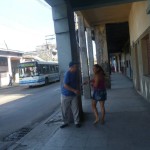
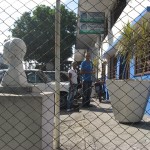
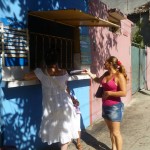
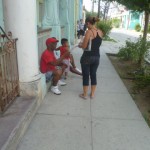
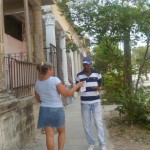
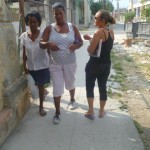
The Citizen Demand For Another Cuba has been delivered to several Peoples Power Municipal Assemblies, to the provincial Cuban Communist Party organizations, and to government sites throughout the country.
The Citizen Demand for Another Cuban demands that the regime ratify the United Nations Covenants: The International Covenant on Civil and Political Rights, and the International Covenant on Economic, Social and Cultural Rights.
Yoss, I don’t know how to harbor rancor, neither would I have a reason why, your open letter was in that moment your opinion and – mistaken or not – I wanted to respect that. I only asked that you be more objective, in the interests of justice. I felt that you were shooting at me from a firing squad, without knowing the story nor the evidences that I provided, as you afterward well came to recognize, and one should not even give an opinion about something if one doesn’t have all the necessary elements to make a judgment.
Yoss, I don’t know how to harbor rancor, neither would I have a reason why, your open letter was in that moment your opinion and – mistaken or not – I wanted to respect that. I only asked that you be more objective, in the interests of justice. I felt that you were shooting at me from a firing squad, without knowing the story nor the evidences that I provided, as you afterward well came to recognize, and one should not even give an opinion about something if one doesn’t have all the necessary elements to make a judgment.
Yoss, I possess and I offered all the proofs that demonstrate my innocence, I have overwhelming evidence of everything, and not only words as they have against me. Evidences against words.
In a few days more my lawyer will add other new evidence for the Review, which will leave still more naked the Prosecutor, the informer and the Tribunal in front of all the injustices that they committed against me, eliminating any doubt about their real and only purpose: to condemn me for dissenting.
At any rate, as in the trial and later the appeal, I hold no hope, because I am not naïve and I have always known who are the ones who want me in jail and who desire my punishment. What’s more, Yoss, I was warned and threatened – as I declared in advance – that I would be sentenced to 5 years and this was a month before the Tribunal pronounced sentence. They did it in front of witnesses. continue reading
It is a pity, as you also recognize, that Cubans do not have access to the Internet, as there are evidences that you are missing, the necessary evidences so that any honest person, once he has seen them, would recognize that I am innocent, and there they are, in hands of the world, except for the Cubans on the island.
I never asked that they believe in me, I have always asked that they check, by their own means, the evidences, so that later they can evaluate it.
Recently a friend visited Cuba. He arrived, convinced of my innocence because he had followed the case, had evaluated it, having the multiple evidences in my favor and the conduct of the Court, its arbitrariness and contradictions to the point of lying with impunity against me and putting on a flimsy show with the intention of condemning me. So this friend, during his visit, and because of the friendship that linked us together, was able to have a conversation with my ex, and he assured me that while they were talking she began to believe him, by what had to do with an appeal to her intelligence and sanity: he had seen all the evidence, he saw the put-up job that she along with the police and the Prosecutor’s Office had hatched, and as well everyone was being manipulated by some tears and a perfect performance. When they had finished, he was completely terrified to find out how her performance was able to give a vision of a perfect victim; then Yoss, if those who saw the evidences can be manipulated, imagine those who have not seen them.
Recently my son – who is already grown and thinks for himself – told me that a few days before he had been with his mother in her home in Calabazar, and upon hearing a noise in the patio, he saw her take a huge knife and go out defiant, threatening whoever was out there, and my son watched in silence. A woman with this temperament could never be harassed or abused by anyone.
With regard to the mother of my son, I just ask God to forgive her; I say this with all honesty, because cynicism is not one of my traits. A day before entering the prison my son tearfully confessed to me that his grandmother called him “traitor” solely because he loves me and he looks for me as I do him, and on the first visit that I received he let me know that his mother threatened him with the loss of the emotional ties with his maternal family if he decided to take any action in my favor.
A few days ago I found out from him that he had failed his grade. Sure, we agree that my son has been the most harmed, but his mother in her spite overlooked it for the sole purpose of hurting me. For myself, I can only provide that my son and I are very happy when we are together, which corresponds to the love that unites us.
During a past family visitation, he wanted to come with me to the inside of the camp in which I was held and where access is forbidden to family members. Violating this regulation, I took him to my bed, I introduced him to the other inmates with whom I lived; I did it so he would leave calm and relieved. I remembered the movie – excepting the distances and time – “La Vida es Bella,” I told him that this place was like a “camp in the country.”
He has been manipulated, but has grown up and has, as he has told me, a burden on his conscience for not having defending me in his moment. I told him, and honestly it’s what I think, that God “writes crooked paths straight,” and He will know why He wanted to have me here, and I thank him for it.
My ex was born and raised in “La Güinera”, a slum neighborhood and therefore hostile, where from a very early age the characters are hardened to survive the social jungle, and which she brags about having broken out and successfully left. Moreover, it is to say that whoever dares to confront her will receive a strong response, “La Güinera”-style.
I repeat once more and hopefully it will be the last time, that when she made the accusations, we had passed two and a half years separated and living in different homes. Earlier, in the first year of separation, she had had lodged an accusation against me, from which I was acquitted, thanks to the fact that even the State Security was not interested. From that time on, they used her for new accusations against me.
Whoever is interested in the truth can also find out the addresses where we lived as a couple and there they will have evidence that there was never an argument nor altercation between us. Only, and to everyone’s surprise, the day we separated we got worked up and I asked her that she not be there when I returned, that she go to her home. It was as simple as that, at my return she was already not to be found. The neighbors testified that they had never suspected that we were having problems, they saw us as a happy couple. That occasion was the first and only time we raised our voices. Those who adjoined my apartment in Calle 11 No. 304, between H and I, Vedado, offered to be witnesses for the trial, but the Court the rejected them.
When I realized that my ex would not cease with her false and constant accusations, I distanced myself, moving to the dwelling of my partner, at a distance of some 20 km from my own, because my ex had rented only 200 meters. With all the immensity that is Habana!
There is no worse blind person, nothing, than the one that he who does not want to see. And believe me that I do not exaggerate when I assure you that at the moment of entering prison, my ex had asked a cousin the loan of a house just two stops from the house of my partner, and where I was residing, so that we would have only one avenue to travel: Rancho Boyeros. She did it without need, leaving vacant the apartment in Vedado, where it was rented out before passing on to be the property of her aunt, who does not live in it, thanks to a bartered exchange. Sometimes my son is the one who stays there. What could it be called, this marked interest of hers to have me close?
Sometimes I think that the lack of information and of the Internet turns the Cubans on the island into skewed beings. Since my punishment was not upheld, the Tribunal had to lie in the sentencing, which may also be seen in the document that is scanned on the Internet, I was penalized without evidence and “MISTAKENLY” with an article that doesn’t even have to do in the supposed case of having committed the crime. “COINCIDENTALLY” said article adds a year(s) more to the punishment, that which invalidates whatever sentencing, forcing to them to repeat the trial.
Why this fear of having a fair trial? They know that a new oral hearing cannot repeat the outrages of the first, because now they are being watched by the international press and public opinion.
If that were not enough Yoss, seek, inquire with your friends and acquaintances, lawyers, judges, prosecutors, and ask whether at any time they have heard of a sentence that is like this or similar to the one in which they imposed on me 5 years, corresponding to a similar offense. Has any of them taken to prison someone who is a first-timer, as in my case, in which the tribunal recognizes one’s professional achievements, as was in my case by being a writer who is nationally and internationally prominent?To all of this one has to add that prison only applies when the sentenced, by reliable proofs, poses a danger to society or to the alleged victim. I reiterate that since it all began until the day of judgment, they spent more than three and a half years.
Yoss, I thank you, that you have investigated, gone deep, and I continue to earnestly ask you to keep looking for that what you are lacking in order to believe in my full innocence, and, I assure you, you will reach it when you see the video of the false witness whom they bought in order to compromise me. Ask people we know, whose names I do not mention, so that you do not to not miss the ethic. They will be able to give you the video which will clarify any glimmer of doubt that remains for you.
In regard to friendship, Yoss, in your letter you were confused, you were excessive, you seemed like the friend that knows everything about me first-hand, and to be a friend is more than a greeting of acquaintances, of colleagues who have ridden for years in this profession of writing. Friendship is an eternal brotherhood, a reason to live, and I have my reverence for my friends. I swear to you that in the future I would like to be able to say of us, for me it would be an honor, to have that doorway to the feelings of the other, his limitations and his values; for me, friendship is a profession, a garden with the most delicate flower that one can offer, full-time, and it was precisely that which happened, that your letter had the effect of being buried alive, a bullet shot to the temple, it being unfair because of me, as I of you, I know nothing more than that which we can observe in our daily happenings.
I was always sure in your case that there were hands, helping the officials, that gave you false testimony. You have to take care Yoss, there are people who appear that they are not such, but they were crushed in their time, and there were those who became agents of State Security and I know, that generation for the most part had no other option than to agree to collaborate, some have confessed so to me. Not only have they confused you, with their unfounded comments, also to some foreigner who steps forward they give their false and distorted testimony, always against me, of course; in fact, they knew I would be imprisoned when nobody could believe it and claimed that they would prevent my entry into the prison, there were these obscure characters who asked my son if the subpoena from the Tribunal had arrived yet.
As for your understanding about the abuse against the Ladies in White, that in my case, erases any possibility of resentment between us.
Finally, it made me laugh, your petition not to be named to a Cabinet, where I would be, anything more nor less than “Minister of Culture”. Yoss, there is nothing further from my mind than that dream, my dream is another: to write in my country without being censured or be persecuted for what I believe or profess, nor any other Cuban. Moreover, when the reality is not the best for the people, I will always be in the opposition, that is the duty of artists. My dream of writing in freedom, as simple and difficult as that, unites us and then and there we will see each other and deepen this friendship that we need to be bullet-proof, because there is no other way, and that I would like to share with you as with the rest of my beloved friends. Until then, there is nothing else to do but hope.
They lied to bring me here, as it is customary for them, they said that I would go into a hospital for a medical check-up, but I already knew that the dermatologist who attended my spots had not issued any order for me to be checked up, and this is what they did when they got me out, they took me directly to the 1580, and as in a lousy screenplay, brought to my punishment cell a female doctor whom I refused to let treat me. They also wanted to avoid certain visits that I could receive in La Lima and I was warned by Lieutenant Coronel Rubén, of section 21 of State Security. Since I have been a prisoner, they visit me to see the result of their dirty work, reveling in my custody. From my arrival in the 1580, I have refused to receive them. According to the prisoners of more years who have traveled the island from Pinar del Rio to Baracoa, the 1580 is the worst prison of Cuba, it is made precisely for violating laws and for doing the dirty work. I wish to repeat that I thank God every day that I’m here. I’m the last one they should bring to this hell.
Heaped in that solitary place, without water or light, without personal hygiene, on a bed of poured concrete, I would remember Edmund Dantes, shut up in If Castle.
And so you see Yoss, by luck or misfortune, to see these men surviving so much calamity, to see them swallow glass, metal, cutting off [their] arms or on hunger strikes with the only hope that someone will hear of their misfortunes and violated rights, and despite everything, to resist the constant beatings, it nourishes my imagination, it multiplies the creation for me and allows me to continue fulfilling this mission of reflecting human pain, of showing readers this hidden face of the time in which we are slated to life.
![]()
Ángel Santiesteban-Prats
Prison 1580. April 2013.
2 May 2013
The announced rescue of sugar production, after the ravages of the Alvaro Reynoso Task that finished dozens of plants, and the adjustments and readjustments of the “upgrade” and the application of the “guidelines”, seems not to have achieved the objectives, with production having, in some cases, declined.
Despite nearly six months of harvesting, it appears that we not exceed the one million four hundred thousand tons of sugar expected (an extended time when historically, with less technological equipment and development, the harvest reached four to five million tons in less than ninety days).
At least, that is what emerges from the literature on the harvest in the province of Villa Clara. Figures are figures: despite organizational measures taken, resources allocated, etc., the harvest produced 11,000 fewer tons than planned (5,400 tons more than the previous harvest, which was 5,600). In addition, it missed the 44% of the time (26.66% is attributed to the rains), the sugar mill capacity reached 56%, a very low indicator, and industrial performance was 10.60.
The listed causes are many: lack of control, lack of coordination and forecasting, rainfall, human activity, especially among those cadres led the process, administrative and technological indiscipline, excessive foreign matter, grinding cane backward and burnt, low combined productivity, lack of on time completion with the necessary means to guarantee the results, indiscipline among the brigades at the beginning and end of the day, poor quality of delivered equipment and parts, late delivery to the centers (up to 37 days overdue), and so on. The list of misfortunes could go on and become endless. A similar picture is repeated in other provinces.
I ask two simple questions: Is this not enough, repeated year after year, to finally understand that the “model” does not work? Why do we have to wait before deciding to discard and replace it with one that has shown itself, despite its imperfections, to be better, more productive and better?
7 June 2013
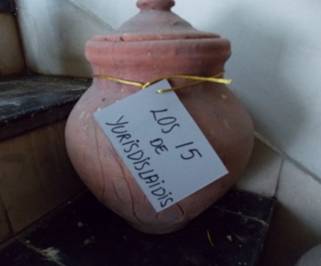
After a disastrous first marriage which bore no “fruits,” Isabel — a slim, young brunette — met a young laborer with whom she fell hopelessly in love. They decided to become a couple almost on the first date. From this “explosive union” a child was born, whom they named Yurisdislaidis because compound names and those with the letter Y were very fashionable at that time.
All her life Isabel had dreamed of having a daughter whom she could “dress up” and shower with affection. After giving birth, she firmly resolved to stash away part of the money she earned as an at-home manicurist in a clay jar that had belonged to her grandmother. She left it in the care of her mother, who did not trust banks. Every week Isabel fattened the jar, depositing part of her earnings in it.
Meanwhile, her selfless husband was using the old Oldsmobile he had inherited from his father as a taxi. He was taking his chances, doing it “on the side,” since he was never able to obtain a license. By redoubling his efforts, he drove more routes than his malnourished body could stand, all in the hopes of bringing home some extra money so that his wife would not have to work so hard or “touch her little savings account.”
They made these sacrifices and many others perhaps not worth mentioning, including foregoing the eighty grams of daily bread allotted to each member of a nuclear family in the ration book, which they gave to the little girl. She got one for breakfast, another for her school snack — filled or topped with whatever they could get their hands on at any given moment — and another to accompany a café con leche which she had before going to bed. This is how Yurisdislaidis grew up, eventually becoming a lovely young lady.
There was still a year to go before the her fifteenth birthday, and the family had already put together a trousseau for the much anticipated celebration. They still had to find a suitable pair of shoes for the occasion, a make-up artist and a photographer.
It was then that Demesio, the father of Yuris — curiously, this is what he called the child, perhaps because it was too much effort even for them to call her by her full name — began working as a mechanic, fixing his neighbors’ broken cars. It was a skill he had learned the hard way over many years by fixing his own car after driving it through Havana’s pothole-filled streets and avenues. All this caused his health to deteriorate, making him look older than he really was.
Isabel’s eyes fill with tears as she describes the unforgettable day in which her beloved husband arrived home exhausted but joyful, “with a smile from ear to ear” and his face glowing with emotion. He was carrying a package in his arms which he laid at her feet as though it were an offering to a goddess. It was a brand-new pair of white shoes with high heels and two shiny buckles as the only ornamentation. A regular client, who was aware of his troubles, had provided them as a gift for his daughter. Now she only needed to find a modern photographer with good taste since she was already getting the make-up artist — a charming gay man, who was the brother of one of her clients — for free. Everything “was set!”
Finally, the long-awaited day arrived. The local Committee for the Defense of the Revolution and the neighbors on the block were all excited, watching the comings and goings of strangers entering and leaving Isabel’s house. It was a big event. From the early morning hours music blared at full volume, alternating with the voices those present, screaming to be heard. These were the friends who had come to clean and decorate the house. In the main room there was still the portrait of the former lady of the house, as always with flowers, who had the foresight to will the place to Isabel, her former employee, legally leaving it to her as an act of gratitude for having been her companion and caregiver after her entire family had decided to leave the country. She had stayed behind because she wanted to die in Cuba.
The first to arrive that day was Francisco, the make-up artist, followed by the lady who was providing the various outfits for the photo shoot. When the birthday girl was finally ready, the young photographer arrived. A stunning 1950s convertible belonging to one of her father’s friends was parked in front of the house, waiting to drive Yurisdislaidis to the Plaza de San Francisco in front of the Chamber of Commerce building. She was dressed in a distinctive costume like those from the Cuban soap opera, Las Huérfanas de la Obra Pía — with parasol and all the other 19th century accessories — to have her picture taken among the pigeons and recently restored historical buildings. Behind Yuris was an entire entourage, darting to the various locations chosen by the photographer. They were the make-up guy, the costume lady, the camera man with his tripod slung over his shoulder and her mother carrying baskets filled with artificial flowers, shoes on loan, wigs of one sort or another, and head ornaments for her beloved daughter.
After returning home, a few “more artistic” photos were taken. These showed her peeking from behind a shower curtain, exposing a bare thigh, pretending to fall down head first with her legs strategically placed above her, coming down the stairway, carrying a hat and suitcase as though she were on a trip, and so forth. These were to fill an album which she would later proudly show to relatives, friends and teachers at her school.
From what I was able to find out later from some neighbors, the party was “over the top.” Beer and rum flowed freely. There were fish croquettes, pastry hors d’oeuvres, cold macaroni salad and guayaba tartlettes, all provided by some friends. Afterwards, they served a big pink cake decorated with flowers and fifteen candles — the kind that do not go out when you blow them — procured by someone who “had come from far away.” The extravaganza ended at dawn, when there was nothing left to eat or drink. To this day people in the neighborhood still talk about it.
Only a couple of years later I happened to run into Isabel, noticing how much older and thinner she looked that usual. When I asked about Yuris, she made an attempt to smile. “She’s fine,” said Isabel, “but she wants to quit school because she says she does not feel motivated. So I am still struggling, trying to fill up the clay jar again. My daughter has now gotten it into her head that she has to be made a saint!”*
*Translator’s note: Kari Ocha, or “to be made a saint,” is an initiation ritual of Santería, an Afro-Cuban religion, and can cost as much as $800 if you are Cuban, and significantly more if you are from overseas.
6 June 2013
For the handy little DONATE BUTTON <-- Click there! 6 January 2013
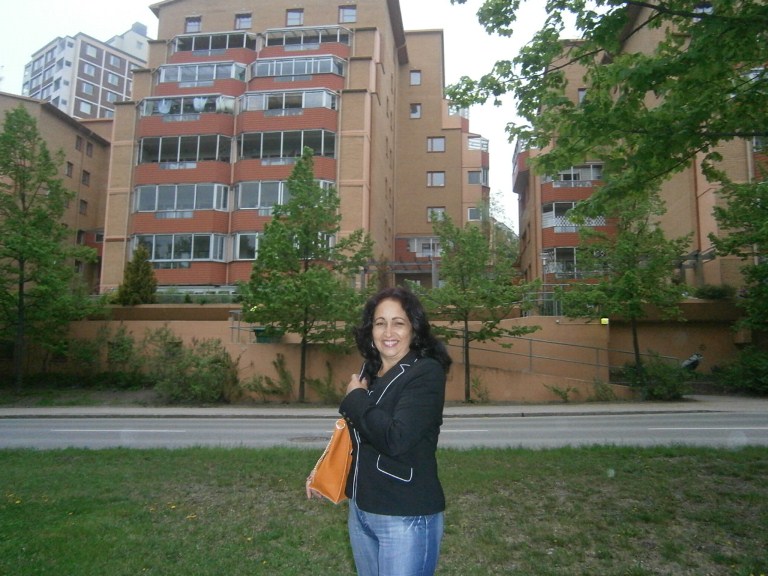
I’ve just returned from a short trip to Stockholm, Sweden, where I was invited by the government of that country to participate in the Stockholm Internet Forum, Internet Freedom for Global Development, which met on May 22nd and 23rd. While there, I had the opportunity to meet up with other Cuban activists living on the Island, with whom I participated on a Cuba seminar that took place at the Swedish Parliament, and a panel on freedom of the press in Latin America, at the press room attached to the Swedish Ministry of Foreign Affairs. Neither one of these activities were related to the event program.
In just a few days in Stockholm we visited a local newspaper, the headquarters of Reporters without Borders, the offices of ECPAT, a nongovernmental organization fighting against child prostitution and pornography and the trafficking of children, and the headquarters of The Civil Rights Defender. We were also invited to the launching of the book We Must Take the Police Out of Our Heads, edited by the International Liberal Swedish Center, a report on the Island’s reality between 1998 and 2012 and the peaceful struggle for democracy, from the perspective of the analyst Erik Jennische.
Of course, I managed to walk around and learn something about the city, its people and places.
Some regular readers have written to me, asking me to comment on this blog what I consider my most important impressions in this experience, and how they could be used in the struggle for rights in Cuba. Personally, I was pleasantly impressed with the reception of Cubans who manage the magazine Misceláneas de Cuba, headquartered in Sweden, with whom we had the privilege of sharing through various meetings they set up for us, and I also met others whom I knew only through the mail up to then (as in the case of Hugo Landa) and the dozens of Cuban residents there and in other European countries that showed extraordinary solidarity with our Cuban struggle. Verifying the bonds that unite Cubans of all points of the diaspora is a source of inspiration and hope in the midst of the totalitarian drought in which we live.
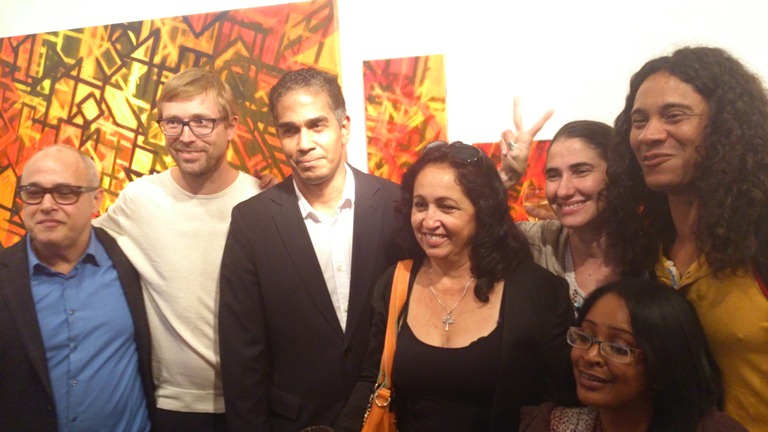
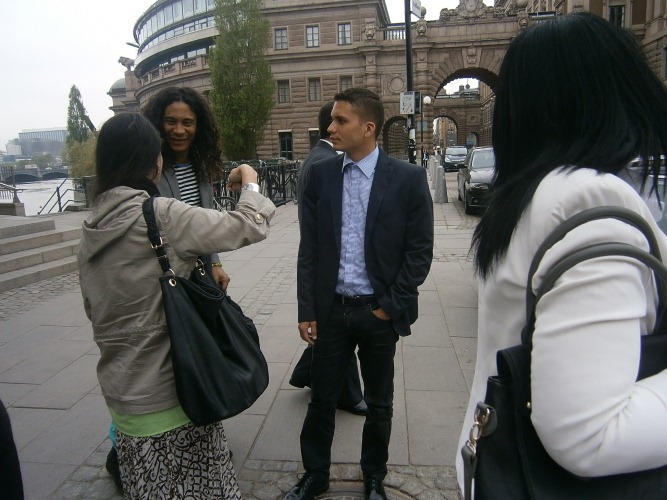
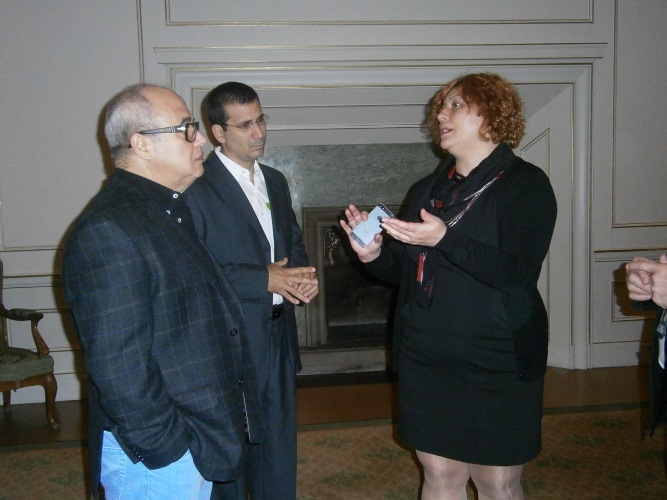

On the other hand, the event’s sessions highlighted the technological backwardness and computer weakness in Cuba. In addition, many of the delegates expressed their solidarity with the cause of freedom of expression, information and news that Cubans are demanding. Some work strategies of various organizations and institutions in Sweden could be useful in the Cuban case, and we established links with them to implement proper agendas, in accordance with our reality.
A few yeomen of the guard were present among participants of this area, questioning our right to demand freedom when “Cubans have guaranteed free health care and education”. I will not repeat our answer to them, but suffice it to say that we did not see them again, nor did they try to boycott our public presentations, for their own good.
To those who have been so concerned about the funding of this trip, I will personally answer, not because they deserve it, but for the sake of transparency. I was invited by the Ministry of Foreign Affairs of the Swedish government, which generously assumed all costs for travel, accommodation and food. I take this opportunity to publicly thank from this space the many attentions received from all Swedish organizations I had contact with, and in particular said Ministry.
Finally, I hope that, in future editions of this Forum, Cuban participants will have the opportunity to tell a different reality than we have at present. As for me, I will continue to do everything possible to contribute to make it so.
31 May 2013
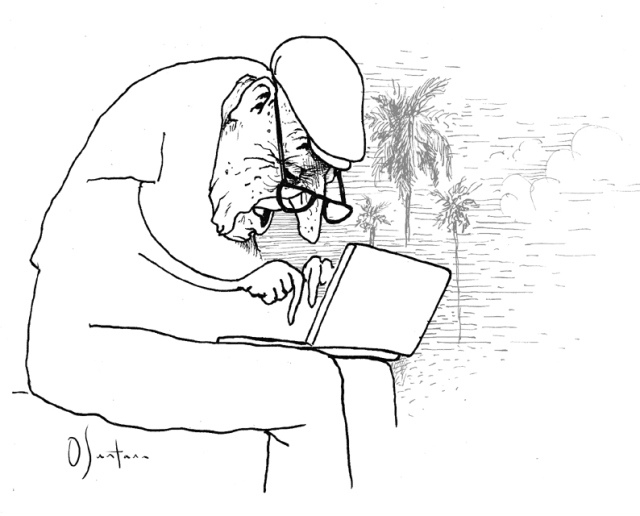
I asked several cyberactivists their opinions about the social network Facebook, about its impact on the island and the relation it’s created, within the island, outside the island, with Cubans and the insults from Power.
Alexis Romay, a good man, partner and friend, sent me (after-hours) this response and was kind enough to include it on his personal blog Belascoaín y Neptuno. Many thanks to him, and to the friends who joined in the debate, thank you as well.
Totalitarianism in the times of social networks
By Alexis Romay
Cuban poet and activist Luis Felipe Rojas, author of the blog Crossing the Barbed Wire, is doing a survey on cyberactivism and, by the way, sent me a question. Here goes, followed by my response.
How do you think social networks like Facebook — with many detractors who see it as puerile — are helping the community of activists on the island?
In a totalitarian regime like Cuba, social activism beyond the margins of Power has a very high cost which started with the automatic conversion of these activists into “dissidents,” which implies a dangerous and immediate association of the term with this aberration of all nationalisms: the dissident is a traitor to the fatherland. We can’t forget that in the name of love, mother, fatherland with a capital F, the worst atrocities are committed.
This isolation of the activists, converted by state decree into dissidents, passes through dehumanization (they are then transformed into “worms” by similar abracadabra), slides down the scale to social stoning and may end in physical death.
In other words, the “worm,” before being one, was a dissident, social activist, citizen, and in the beginning, a person. I put the steps in order to illustrate the precipitous drop on this scale in which the nonconformist Cuban — or person in any other totalitarianism — begins his journey as a human being and ends it in the order of invertebrates.
I give this preamble to highlight the pariah status that opposition in Cuba leads to. In the face of this forced isolation to which Cuban activists are subjected, social networks, not just Facebook, become the human tissue that envelops them. To feel the support of a virtual community has a specific weight for anyone who has been separated, by imperial edicts, from the society to which they belong. But in addition to filling this gap, social networks also serve as a protective shield for activists; they make the impunity of the regime ever more costly for it at the international level; they remind the Castros that the vast dungeon they have made of Cuba has glass walls and it is already impossible for them to hide their repressive methods.
If the political police evict a family of opponents, deal out a beating, or effect an arbitrary arrest at eleven in the morning, five minutes later the information will be circulating on the networks with hashtags that tarnish this great achievement of the regime of the island which is projecting an image of itself that does not correspond with its totalitarian reality.
In fact, Castro has a huge presence in the networks, the budget allocated for this purpose must be incalculable. As Cuban Democrats we can and should establish a presence on the networks with an infinitely more appealing discourse, creating and disseminating our own spaces. This will be the testing and projection in the digital world of that democratic country we dream of.
5 June 2013
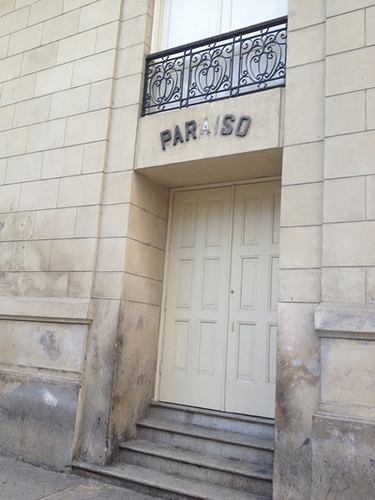
They’re no longer dressed in blue uniforms and some boys even show off their rebellious manes. Hair that no teacher will demand they cut — at least for the next few weeks — hair that will ultimately fall to the razor of Obligatory Military Service. They still look like students, but very soon many of them will be marching with rifles slung over their shoulders. They are young men who just, days ago, finished their school days at different high schools all over Cuba. The college entrance exams are long past and this week they’ve learned who will have a place in higher education.
Just outside the schools, the lists of the accepted and unaccepted speak for themselves. José Miguel Pérez High school — in the Plaza of the Revolution municipality — could be a good example to explain the situation. This educational center is one of the best performing high schools in the capital. A situation partly due to the professional and economic composition of the neighborhood, which means many parents can afford after-school tutors (we refer to these as “dishtowels” — they clean things up). Despite these advantages, the end-of-year statistics for this school are more alarming than satisfying.
Of 233 12th grade students in this high school, 222 took the entrance exams and only 162 managed to pass all tests. The rest will have to go to a second round, or content themselves with failure. The highest number of low marks was in Math, in which only 51 students achieved a score of between 90 and 100 points. In the applications for careers, teaching specialties are repeatedly put down as a back-up choice; “To guarantee getting a place, even if the tests don’t go well,” these potential teachers of tomorrow say, with a certain indecency.
Statistics from José Miguel Pérez High School
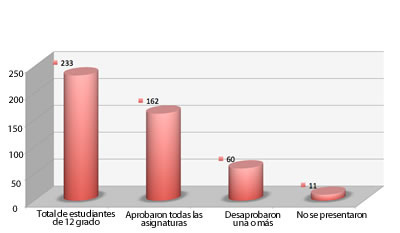
The beginning and end (?) of a mistake
The young people who completed secondary school this year are the products of the educational experiments led off by the so-called Battle of Ideas. They are 17 and 18 today, so they started junior high as the “Emergent Teachers” program was gaining strength, a program that put hastily trained young people barely out of their teens — if that — at the front of the classroom. Today’s graduates were educated in classrooms where television and VCRs were the protagonists, for lack of sufficiently trained teachers. At the most difficult times they could count on receiving at least 60% of their classes from a screen. They also went through puberty at a time of rising ideological indoctrination. While it is true that this has always been inherent in teaching in Cuba over the past five decades in, its climax came after the Elian Gonzalez case. Fidel Castro took advantage of that event in the late nineties to impart a twist to the political discourse in all aspects of national life.
Those who graduated from the twelfth grade a few weeks ag, are the first batch who did not have to go to boarding schools in the countryside. Encouraging news for the young people themselves and especially for their parents. However, the readjustment for teachers caused by the change forced many of them to rethink careers based on study, books and binders. The teachers who came from these schools in the countryside had to adapt to new conditions. Despite the difficulties of the former regime of internment, for the teachers these countryside schools were sites of direct contact with the farmers who sold or traded for agricultural products. One of the few incentives for working in such a place was being able to take some bananas, taro, pork or fruit to the city at a much cheaper price than in the markets of Havana. The loss of that little privilege discouraged some teachers from continuing on the path of teaching.
Memorize or question?
The countless hours lost in the classroom to teacher absenteeism is another of the hallmarks of recent graduates. To this we have to add the decline of the investigative character of science instruction, due to the deterioration or absence of chemistry, physics and biology labs. In many high schools chemistry experiments were practically canceled due to the shortages and fear that students would have access to the chemicals. Physical education, computer science and English were the biggest losers in the exodus of teachers to other areas of employment. High school education emphasized rote learning of dates, names, events, without progress in creating their own opinions, a spirit of asking questions, or the capacity of discernment. Graduates can hold in their heads the years and important days of our country’s history, but fail to form their own opinion about what it all means.
The quality of handwriting, spelling and the correct use of Spanish also fell short as educational objectives. This coming September, university classrooms will see students with serious deficiencies in all three areas. But that does not mean that they will be faced with excessive demands or be unable to complete their programs of study. They will attend a University whose quality of teaching is far from that once exhibited in Cuba. In the 2013 ranking of Latin American universities, the University of Havana fell from position 54 to 81, another sign pointing to the urgent need to review the entire educational model. The educational level of the new entrants to higher education, has forced them to lower the bar.
The tinkering with the alchemy of learning, the successive experiments marked more by the voluntarism than scientific analysis, the excessive presence of ideology in every subject, the encouragement of docile, rather than questioning, minds, students’ limited access to updated materials (read internet) and the educational fraud that flourishes where ethics is absent, are all undermining one of the main pillars of national identity: that which consists of knowledge, academics and teaching. But a problem can not be remedied unless we confess that it exists. So while they continue speaking in a triumphalist tone about Cuban education, it will continue to sink into mediocrity, into material and pedagogical deterioration.
6 June 2013
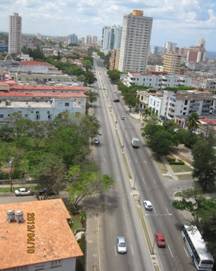 Without any hint of shame the state-run press reports that an American citizen attending a public presentation by her president at the National Defense University interrupted him and even questioned some of his policies in a rude manner according to several journalists present. The importance of this news for Cubans lies in the fact that this woman, as well as many other people in the United States and other democratic countries, have the right to do this. In our country on the other hand, not only would it be considered a serious action, you could also spend years in jail for it.
Without any hint of shame the state-run press reports that an American citizen attending a public presentation by her president at the National Defense University interrupted him and even questioned some of his policies in a rude manner according to several journalists present. The importance of this news for Cubans lies in the fact that this woman, as well as many other people in the United States and other democratic countries, have the right to do this. In our country on the other hand, not only would it be considered a serious action, you could also spend years in jail for it.
In another article it is reported that, in a session at the Ninth Congress of the Union of Cuban Journalists, someone posed the question, “What sort of journalism does Cuban socialism require to make it stronger as it goes through a period of change?” The replies all have a common denominator: to petition the state to act less as a guardian and to request authorization to be more critical, though always “being aware of the challenges that the country faces in the midst of the incessant and worsening harassment by the American government, which has not abandoned its goal of destroying the country’s socialist project…,” blah, blah, blah. Without the least embarrassment these journalists accept state control over what they write and report, and their appeal amounts only to “being allowed to write and report a little more.” It was always my understanding that rights are not something to be begged for, but rather to be demanded.
Another article mentions a “big tweet for Cuba” (a reference to the Five*, who by now, if my math is correct, are four), accompanied by a photo of a “stand in” at the front of the White House. As I indicated at the beginning of my post, how wonderful to be able to do all this freely, without anyone interfering! It is as safe and secure as a picnic. In democratic countries, that is, because if these things happened in ours, they would all be considered “destabilizing actions orchestrated by local mercenaries fulfilling orders from the empire.” That simple.
It is striking that presumably intelligent people would lend themselves to this sordid political game by participating in it as though they were performing a commendable action for which they deserve respect and even applause. I believe the solution to the problems between the governments of Cuba and the United States (and I say governments) must be through dialogue. I do not believe it can be achieved through tortuous paths, but through truth, honesty and frankness, assuming each lives up to its responsibilities.
*Translator’s note: Five Cubans serving prison sentences in the United States for espionage, for whose release the Cuban government has been actively and publicly campaigning. One of the four has been paroled and recently returned to live in Cuba with the permission of the American courts, in exchange for giving up his U.S. citizenship.
3 June 2013